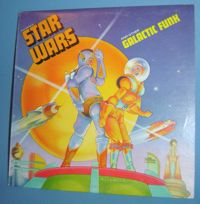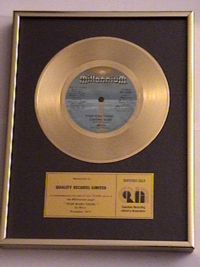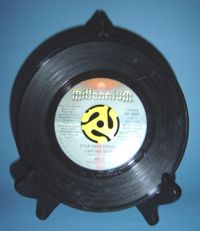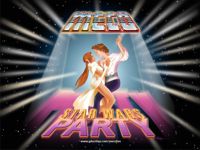
May 2005: Rebelscum staffer Shane Turgeon recently got a chance to visit with Meco, the man responsible for the huge album from 1977, Star Wars and other Galactic Funk. He has a new CD called Star Wars Party. Read along as we find out how this all came about...
Part 1
In 1977, Star Wars fever had gripped the world. But lo?, there was another fever in the air; one that struck its willing victims hardest on Saturday nights. Disco fever was alive and well that summer and a young record producer by the name of Meco Monardo (mee-ko mo-nar-do) launched his career by combining the hot music of the day with the hottest film of the decade - creating a veritable Super Fever. The single from ?Star Wars and Other Galactic Funk? quickly rose to number 1 and helped solidify Meco?s position as a pop producer. Now, nearly 30 years later, Meco is 65 years old, enjoying retirement in South Florida and is gearing up to release Star Wars Party, his latest foray into the wonderful world of Star Wars music. Join us as we take a look at Meco?s past, present and future in this, the first of our 3 part interview with Meco Monardo.
Shane: So let?s start out with you telling us about young Meco, how you got into music and the interests that helped create who you are today.
Meco: I was born in a small town in Pennsylvania called Johnsonburg. It was a small coal-mining town and we made paper for the Saturday evening post. My father, who came from Italy, was in a local band and played the valve trombone. You know how trombones will have slides, well, in the old days they had valves. For my musical background, when I was very, very young I wanted to learn how to play the drums and my dad said, ?No way are you going to play the drums ?cause that is not a musical instrument. You have to learn to play music first?.
So he taught me music. Get this, I never played or used an instrument for a year and a half ? I learned what is called solfeggio - it?s the Italian way of learning how to read music and for a year and a half, starting when I was five years old, that?s all I did was learn how to read music. Consequently, as a result of that training I became probably, the best, what we call, sight reader of music in the world because when I finally went to NYC to become a session trombone player that was what was required of you - to come in and just read music that you?d never seen before. And I could do that with not only trombone parts but with everybody?s parts. I?m very grateful to my father for teaching me that.
So, then I learned to play trombone and when I was in 6th grade, and the trombone was longer than I was tall, I was the first trombone player in my high school band, that?s how good I was. I won every competition in Pennsylvania for trombone and I won a scholarship to the Eastman School of Music. I went there for 5 years, decided to be a classical trombonist and became one of the best classical trombonists ? I could have been in any symphony that I wanted to but there (at school) is where I really discovered jazz. My classmates were people like Chuck Mangioni, whom I?m sure you?ve heard of and Ron Carter, one of the greatest bass players in the world and that was my interest with Jazz.
Then I was drafted into the army and I served my time for three years with the West Point Band. Very, very nice place to be because it was right outside New York City and that was right about the time that this group called the Beatles came into the world and I started to listen to pop music. So, in 1965 I decided not to pursue classical music but to become a pop trombone player. I went to New York City, broke, no money, no nothing and I literally starved for almost a year because I learned then that you don?t go out on the road with bands who ask you to go out on the road because once you?re on the road you can no longer make connections in New York. I made a connection with the best trombone player there and he thought I was great. He sent me to all the jobs he couldn?t go to and that?s how I became the number one studio trombone player for many, many years. I transferred into arranging after I met somebody named Tony Bongiovi who built the Power Station, a very, very famous studio, his cousin is Jon Bon Jovi who we all know. Tony and I started a little production company and from that production company we produced two Top 10 records, one was Gloria Gaynor?s ?Never Can Say Goodbye? and ?Doctor?s Orders? by Carol Douglas. ?Never Can Say Goodbye? is the first record ever to be listed in the new disco billboard chart in 1974 so I?m very proud of that fact. So, I did that for a couple of years.
Now, the year is 1977 and I?m a successful producer in NYC having the time of my life and enjoying it so much. I went to see a little movie that opened on the 3rd or 4th Wednesday of May 1977, nobody heard about it but I am a serious science fiction fan and went to the movie just because of that.
Shane: Okay, you?ve mentioned you?re a huge science fiction and film fan. Before that fateful day in May of 1977, what were some of your favorite movies?
Meco: 2001, Forbidden Planet, War of the Worlds, oh my goodness, every science fiction movie that was ever made, I saw them all. When I was in high school I read every science fiction book that was in our library including the complete Tarzan series by Edgar Rice Burroughs. So that was my fascination with science fiction. And then my second fascination was film. I mean, I love films, as most people do, so you combine the two and it was ripe for what happened next.

Shane: So, tell me about that day then in 1977.
Meco: I lived in midtown Manhattan and there was only one theatre that was showing it (Star Wars) and that was downtown Manhattan and it was a walk of about 20 blocks which I walked early in the morning for the first showing at 11 o?clock. There must have been 40 people there ? 39 kids and me. I saw it, I went crazy berserk and I said, ?This is the greatest movie I?ve ever seen in my life!? and so I wanted to go back the next day. I did and I sat through 3 showings in a row and *this* time I heard the music. Believe me, I did not hear one note of music the first time because the action was so great and the movie itself was so wonderful. Now I heard the music and I realized this guy, John Williams, who wasn?t just a kid off the street, he had done a couple of things prior to this ? he had written what I know to be a fantastic theme for the characters, in other words, Luke Skywalker had a theme, Princess Leia had a theme, etc, etc and there was a main title theme. So, I had this brilliant idea, or a smart idea if you will, or even a smart ass idea (chuckles) that not only is this going to be the biggest movie *ever*, that everybody?s going to want to see it and after they?ve seen it they?re not going to get enough of it - they?re going to want to, are you ready?dance to it.
So, I?m a cocky record producer, I pick up the phone a few days later and call two record company presidents. The first guy says ?Get lost kid? and the second one says, ?Hmm, let me see the movie?. He called me back a few days later and said, ?You know, you might be right ? here?s a few bucks, go make an album?. Now, this is the middle of June before I even got to go into the studio with my people. I hired two co-producers, went in and all told there must have been 70 musicians altogether ? one of the biggest horn sections ever assembled for a pop recording. I used 4 French horns, 4 trumpets, 4 trombones, and 4 reeds and the reed players played everything from flutes to saxophones. Now I just wanted to recreate John Williams and the London Symphony?s power and of course the ruling style of pop music at that time was something they called disco. So I chose to do it in a pseudo-disco beat. One side of the album was to be all Star Wars themes, 15 minutes long, without a break, at the same tempo, which was the prevalent kind of disco treatment. The other side was three songs not Star Wars related.
We had no synthesizers at that time, we didn?t have any sound effects from Lucas ? he didn?t know who I was and I didn?t know who Lucas was. The thing that made my record sound like I used synthesizers was that I would use certain tricks. For instance, every single time that the trumpets played the melodies, which they played quite a lot, I doubled that with an electric guitar. That kind of thing, the unusual doubling of instruments, led to the sound that people thought was synthesizers. Of course, there were some synthesizer sounds in order to create R2-D2 and we used the primitive synthesizers that they had in those days but we did not have the kind of synthesizers like everyone has in their house right now ? they just weren?t around in 1977.
We finished the record pretty quickly, a couple weeks after we started it, and everybody was pretty excited about it; we thought it was kind of fun. One of my co-producers said, ?It?s fun, but where is the melody??. And the other one, who really should have known better says, ?I don?t hear a single?. So I went in with a very young engineer and took the two-track master recording and this is where the magic came from. I took the first part of the album which has the main theme which is about a minute-and-a-half to two minutes long and then I made an edit ? I cut from there to way into my 15 minute treatment, I cut about 6 or 7 minutes into it, into the cantina section and then I worked the cantina section for a minute and a half or so and I came out of that and finished the record with about half a minute of the main title theme again. And that became the single. Then I played that for my friends and they all just had this smile across their faces and they knew there was some magic there.

Needless to say, it went out a month-and-a-half to two months after the movie was out and John Williams? single was already on the charts doing very nicely for a symphonic single at that time ? in fact he went all the way up to number 10 on the billboard pop charts which was very unusual for a symphonic rendering. But I passed him and went to number 1. Number 1 in the world as a matter of fact and sold 2 million copies ? that is a Platinum certification from the RIAA (The Recording Industry Association of America). It turns out that I am the only instrumental artist who has ever been certified as a 2 million seller. Even in the States. I?m real proud of that fact.
Shane: What were your studio musicians thinking when you grouped them all together to make this record? Were they hesitant a little bit or were they all for it?
Meco: They were all for it! First of all I hired the greatest arranger at that time, his name was Harold Wheeler. Now, I?m a *very* good arranger, graduated from the Eastman School of Music, but I?m smart enough to know that there was somebody there in New York at that time who was better than I. We had many meetings about what I wished to have happen and instead of me writing the notes, I told him what I wanted to hear and then he wrote the notes better than I could have written the notes. So, then we walked into the studio and of course, in those days we didn?t record everybody at one time, we recorded the rhythm section first then once we were happy with that, on another date and another session we?d bring in the 16 horn players and then on another date, another session we?d bring in the 15-20 string players and we?d do overdubs. So when we did those individual sessions, everybody loved what we were doing because it was so fun and interesting and at that point the movie had started to pick up momentum and all the musicians knew about the phenomenon that was growing called Star Wars so they were thrilled to be playing on it.
Shane: I can imagine.
Meco: And one of the interesting things that happened was with the Cantina Band theme. There were 4 saxophones playing but they were not playing in the key or register that they were playing it live. What we did was slow the tape down to half the speed and so they played at half the tempo, and when we sped it back up to the real speed that?s when we got that really high, funny sounding, extraordinary thing called the Cantina band saxophone section playing the melody.

Shane: Okay, so the record has come out, it does really well, with the single ultimately selling 2 million copies. What was Lucasfilm?s reaction to all this? When was it that you finally heard from them?
Meco: Right. As far as Star Wars, I believe I had no correspondence with them on Star Wars whatsoever.
Shane: Really?
Meco: None. Nothing from Mr. Lucas or from Lucasfilm, good or bad. On the other hand, John Williams?.
Shane: (laughs) That was actually going to be my next question. What did John Williams think of all this.
Meco: Ok, so this is how this went down! John Williams and I were both up the following year in February of 1978 for the Grammies. We were both up for Best Instrumental Performance ? Star Wars by the London Symphony Orchestra and Star Wars by Meco; the number one record in the world. So who should win? Of course, I should win! But I didn?t. John Williams won. Because the Academy members are older, and they knew his name and nobody had even heard about Meco, they didn?t know what the hell I was. Most of them probably hadn?t even heard my record. So, he won of course, and I went to the Grammies and I had been nominated 4 more times after that and I just never won because if I can?t win with Star Wars, what am I going to win with? And I was very disappointed. So, he had heard about that and through the record company president they conspired to do something and it?s still on my wall right now ? they sent me a plaque. It?s 2ft by 4ft and on one side is a reproduction of my cover and on the other side is a reproduction of the Billboard Hot 100 where I was number 1. But on my cover he wrote in his own hand writing, ?Dear Meco: You?re my Grammy winner. Thanks for this marvelous version. Fondly, John Williams?. It?s his way of saying that he recognizes what I did, recognizes that I helped him win the Grammy if you will, and I really like that gift.
Shane: That?s a really nice gesture on his behalf.
Meco: Exactly. And if I?m not mistaken he did the personal liner notes for the Superman album I did a year later.
Superman? But this is a Star Wars interview! And where Meco?s concerned, there?s plenty more Star Wars to talk about! Be sure to join us in 7 days time, on June 3rd for part two of our Meco extravaganza! In the meantime, if you?re interested in checking out his latest CD, Star Wars Party, it?s available for purchase only from CdBaby.com.

Part 2
Part 3
Be sure and check out Shane's website Tatoosandtoys.com.

